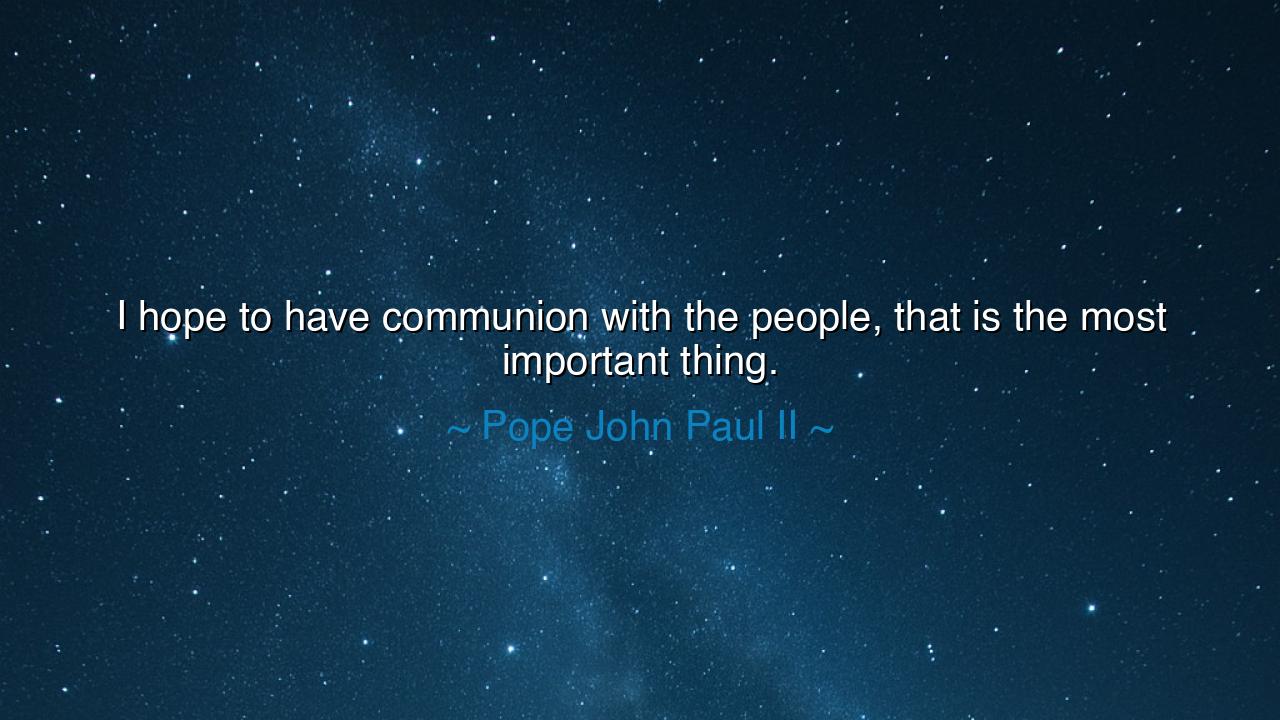
I hope to have communion with the people, that is the most






The holy shepherd Pope John Paul II, whose voice carried across nations and whose heart embraced the world, once said: “I hope to have communion with the people, that is the most important thing.” These words, spoken with the simplicity of a saint and the depth of a philosopher, capture the essence of his mission and the eternal yearning of every true leader—to be one with those he serves. For what is a leader without the love of his people? What is a shepherd without his flock? In this single line lies the secret of all genuine greatness: that power without communion is emptiness, but love shared among souls is the beginning of eternity.
To have communion is not merely to speak or to be heard—it is to unite. It is the meeting of heart with heart, of soul with soul. Pope John Paul II understood that his role as the Vicar of Christ was not to stand above humanity, but to dwell within it. His calling was not isolation in the ivory towers of the Vatican, but the embrace of the suffering, the poor, the young, and the lost. His communion was not a ritual alone, but a living relationship—a sacred bond between the divine and the human through the medium of compassion. This communion was the echo of Christ’s own teaching: “Abide in me, and I in you.” To walk among the people, to share in their joys and sorrows, was to live out that divine call in the flesh.
The origin of this quote reflects not only his papal ministry but his entire life’s path. Born Karol Józef Wojtyła in Poland, he grew up under oppression—first the Nazis, then the communists. He saw a world divided by hatred and fear, and he came to understand that the truest power lies not in force, but in connection. When he became Pope in 1978, he carried that belief to the ends of the earth. He traveled more than any Pope before him—over 700,000 miles across continents—not to rule, but to be present. In every place he went, from the slums of Manila to the ruins of Sarajevo, he spoke not as a monarch, but as a brother. His wish “to have communion with the people” was not ceremonial—it was the living expression of humility and solidarity.
History itself bears witness to his power of communion. In 1979, when he returned to his homeland of Poland—then shackled under communist rule—millions came to hear him. He did not speak of rebellion; he spoke of dignity, of faith, of the sacred worth of every human life. In that gathering, something profound happened: the people, long silenced by tyranny, found their voices again. The Pope did not raise a sword, yet his words became the spark that would eventually ignite the Solidarity Movement, leading to the peaceful fall of communism in Eastern Europe. His communion with the people did not merely comfort them—it transformed history.
This quote, though simple, carries the weight of divine truth: no leader, no teacher, no human being can stand apart and hope to guide others. To influence hearts, one must first open one’s own. Pope John Paul II teaches that communion begins not with speeches or authority, but with presence—with the willingness to listen, to understand, and to share in the burdens of others. To “have communion with the people” is to see in every person a reflection of the divine, to recognize that holiness does not dwell only in churches or temples, but in the living spirit of humanity itself.
Even in his suffering, this communion remained unbroken. In his later years, when illness bent his body and dimmed his voice, he continued to appear before the faithful. Each trembling gesture, each whispered word became an act of shared endurance—a testimony that love unites beyond pain and weakness. The people who saw him in those final years did not see frailty—they saw strength born from communion. He had given his life as an offering to others, and in their devotion, his purpose was fulfilled.
So, my child, take this teaching to heart: seek communion, not domination. In your family, your work, your community, do not strive to stand above, but to stand with. Listen before you speak, love before you judge, and share before you command. True greatness is not found in being admired, but in being understood—and understanding others in return. The bridge of communion, once built, carries more power than any throne or title.
For as Pope John Paul II reminds us, the most important thing is not to live apart from the people, but to live among them—to feel what they feel, to bear what they bear, and to remind them that they are never alone. Communion is not a privilege of the few; it is the destiny of all. In this sacred fellowship of hearts, both heaven and earth are joined, and humanity becomes one family again. Thus, to seek communion is not merely to follow the example of a great pope—it is to walk the eternal path of love, the path that leads every soul home.






AAdministratorAdministrator
Welcome, honored guests. Please leave a comment, we will respond soon